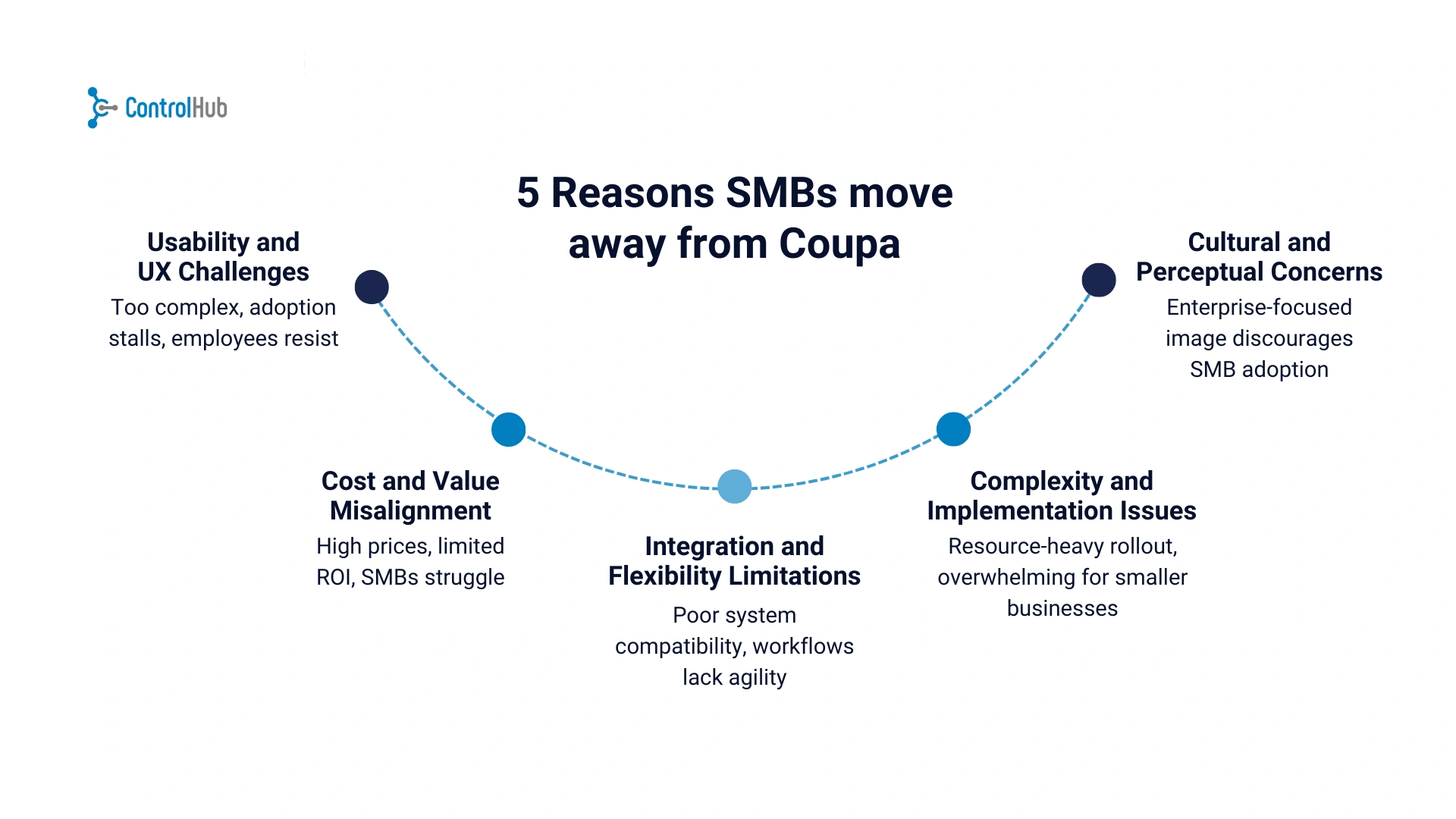Free Supplier Risk Scorecard Download
Download our free supplier risk scorecard here!
Download the free tool!AI Summarize:
There's no denying that Coupa is a giant in the spend management software industry.
Complete smart visibility over your processes sounds good, especially if it comes from a constantly recognised leader company.
However, just because Coupa does some impressive work with global Fortune 500 companies, it doesn't mean it's the best alternative for every single business out there.
If the system is too complex, too expensive, or too rigid to integrate with your existing operations, the shiny benefits quickly get overshadowed by daily frustrations.
That’s why you’ll find plenty of discussions in procurement circles and on Reddit where SMB owners and finance leads ask the same question: Is Coupa really worth it for us?
More often than not, the answer is clear: No.
5 Reasons SMBs move away from Coupa
Usability and UX challenges
When searching for procurement and spend management platforms, there's something you must always bear in mind:
The solution you choose needs to be user-friendly.
Meaning?
You don't have to spend months or years figuring out how to make it work.
And…that's exactly what makes Coupa a big pain in the back for a lot of people.
Tasks that should be simple, like placing an order, checking a budget, or pulling a quick report, often take multiple steps, buried under layers of menus.
Of course, if you are a large company with hundreds of people in your procurement department, that might not necessarily be a huge problem. You could just deploy or hire consultants, experts in Coupa, and wait for things to roll out.
That's a luxury SMBs can't afford.
The result? Adoption stalls. Even if leadership wants the system fully implemented, employees resist using it because it feels like extra work. And a procurement tool that isn’t widely adopted is basically useless.
Cost and value misalignment
Companies charge for their services according to their target market, right?
If your end customers are large enterprises, it's logical to set up your price tag in the highest rank.
Coupa was created around that mindset, so if you're a small or medium-sized business and considering Coupa just because it's a big player in the industry, brace yourself for paying big numbers as well.
The promised efficiencies, like tighter spend control or reduced maverick purchasing, get lost in the daily complexity of the system.
Teams spend more time wrestling with the tool than saving money through it. For companies that care deeply about keeping cash flow healthy, that’s a problem.
Integration and flexibility limitations
ERP systems, CRMs, and niche platforms need to work together seamlessly.
This is where Coupa can feel like a mismatch. While it claims to integrate with major systems like SAP or Oracle, users regularly report friction, delays, and compatibility issues.
Flexibility is another problem.
Companies, like start-ups or mid-sized growing businesses, seek agility above all.
Coupa is great, but it's also a mature, standardized system, which sounds good in theory but can be a headache in practice.
Many SMBs find that they can’t easily tweak workflows, change approval rules, or adapt the interface to fit their operations.
Complexity and Implementation Issues
Do you want to know the main reason behind people's frustration with Coupa?
It takes a whole army of consultants to discover how the heck it should be implemented.
In a world where the balance around supply chains can change overnight, time is a precious resource.
Implementing Coupa isn’t just a software rollout; it’s a full-scale project. Large enterprises expect that they’ll allocate project managers, consultants, and IT staff to make it happen. For SMBs, though, the process often becomes overwhelming.
Configuring the platform, cleaning supplier data, and training employees take resources that you might not necessarily have.
Cultural and perceptual concerns
Beyond features and pricing, perception plays a role in why SMBs leave Coupa.
In procurement communities, the platform has developed a reputation as an enterprise-first solution.
That branding alone can be enough to make SMB leaders wonder if they’re in the wrong place. If peers on forums and industry groups are saying “Coupa’s too much for a small business,” it might influence your final decision.
Some of the cultural commentary is harsher.
On Reddit, you’ll find strong negative opinions about Coupa’s customer experience and even its corporate culture.
Free Supplier Risk Scorecard Download
Download our free supplier risk scorecard here!
Download the free tool!The Lesson
Choose the software that makes sense for your business
At the end of the day, big names and impressive reputations are worth little if your business can’t benefit from all that glitter.
Coupa is an excellent solution for large enterprises or companies that don’t see any problem dealing with long, like really long, implementation times and absolutely rigid platforms.
If that’s not your business’s cup of tea…
You have plenty of options out there in the market. Check out our previous article about it or just do yourself a favor and choose ControlHub agile and scalable procurement software.
Free Supplier Risk Scorecard Download
Download our free supplier risk scorecard here!
Download the free tool!Free Supplier Risk Scorecard Download
Download our free supplier risk scorecard here!
Download the free tool!Free Supplier Risk Scorecard Download
Download our free supplier risk scorecard here!
Download the free tool!Key Takeaways
Usability matters. If your team hates the interface, adoption will fail.
ROI is non-negotiable. Expensive platforms must deliver measurable savings, or they’re not worth it.
Flexibility beats rigidity. SMBs thrive with tools that adapt to their processes, not the reverse.
Implementation shouldn’t drain resources. If it takes enterprise-level manpower to run, it’s probably not right for an SMB.
Perception plays a role. When peers and suppliers view a tool as enterprise-only, it signals a misalignment for smaller businesses.
%20(1).avif)















.png)


